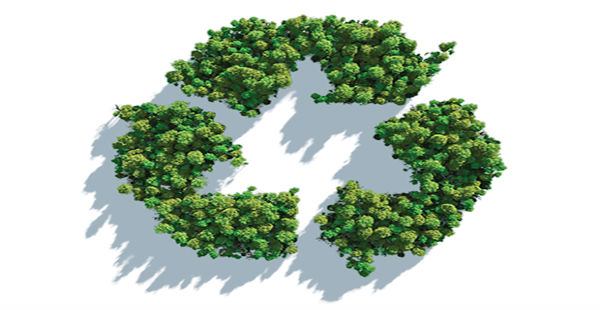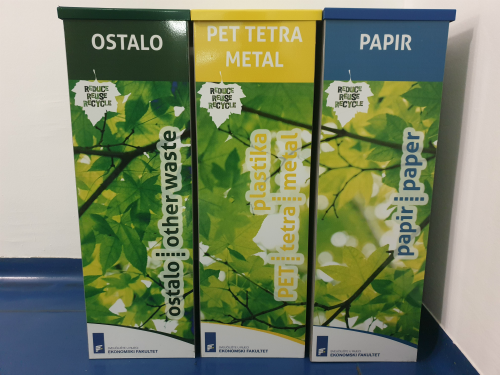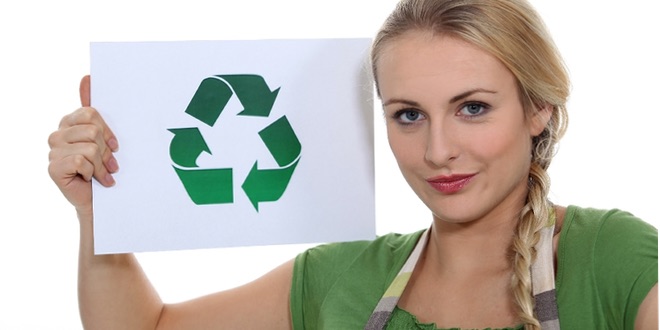RECYCLING

University of Rijeka, Faculty of Economics and Business began recycling its employees and students garbage
At Faculty of Economics and Business, University of Rijeka there are spaces with recycling bins marked with blue, yellow and green color on each floor.
BLUE color - denotes paper and cardboard products
YELLOW color - Indicates PET, tetra (plastic bottles, plastic wrappers, carton) and metal
GREEN color - Indicates other types of waste

Recycling is the process of collecting discarded products, sorting and turning them into new materials to make new products of similar or the same purpose. Recycling includes everything that can be used again, without being discarded.
The word "recycling" comes from words: RE+CYCLE. Circling again.
You can recycle 90% of the waste. There are a lot of products made of materials and raw materials that can be recycled, for example products made of plastic, metal, paper, cardboard, glass... Some raw materials, materials or products are not biodegradable and cannot be recycled, so bio replacements need to be found for them.
When we have extra clothes in our closet or a pair of shoes we don't want to wear anymore, we can give them away. Giving things away, the items we no longer need is also a form of recycling, a much more humane and more meaningful procedure than throwing unnecessary things and/or products away.
An excellent example, and also the oldest form of recycling is compost. Composting of waste is a procedure that implies decomposition of bio waste, which is produced by carbon dioxide, water, warmth and compost, as the final product, in just a few months. The compost feeds the plants, ensures soil aeration, holds the water and positively influences root development.

Guide to Household recycling
A series of procedures that will help you contribute to reducing waste in your home:
Reduce consumption and waste production
· only buy the things you really need, think carefully before every purchase; do you really need all the things you want to buy
· use reusable linen bags and containers when you go shopping or traveling
· select products that come in returnable or reusable containers
· avoid items that are individually packaged, for ready-made food bring your own containers to avoid the use of disposable plastic
· Avoid bottled water, because it's more expensive and because its consumption generates large amounts of plastic waste
· Bring your water to work, school, daycare or a picnic in your own reusable bottles. The water is healthier if you keep it in a glass or aluminum bottle, and such bottles can be permanently used
· reduce the amount of scrap paper by printing on both sides of the paper
· give away the things you don't want, instead of throwing them away
· Mark your mailbox if you do not want to receive unwanted mail like flyers, that way we reduce the amount of scrap paper
· Buy non-toxic products and multi cleaning products to reduce the amount of hazardous waste and reduce environmental pollution.
When you know which items you can recycle:
· find a convenient place in your home or backyard where you can put separate waste bins
· in your home, you can arrange the waste bins in the kitchen cabinets or next to them so they will always be at your fingertips
· an area on the balcony or terrace is also suitable for storing waste bins
· here you can see more possible solutions on how to organize the separation of waste in the house or apartment: On the balcony, in the kitchen, in the elements...
· make sure you encourage everyone in your household to think of a way they can reuse or recycle before they decide to throw it away
Recycle at home
Separate waste bins can be found on almost every street in the city of Rijeka.
Useful tips that can help you to separate and recycle your waste:
· Certain items must be washed before you can put them away for recycling, like glass bottles or containers for example, which is why you should wash them out before you put them in a bin. You can sometimes use the water you used to wash dishes or wash vegetables for your lunch.
· In your home, keep separate bins for plastic, paper or glass, near a bucket of bio or mixed waste, so you can take it out and recycle at the same time.
· You can make waste separation and recycling your weekly routine. When you go to the store, you can throw the waste in the correct bins on the street.











